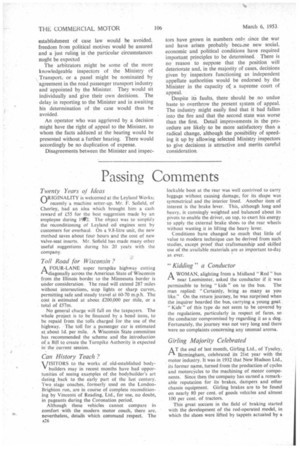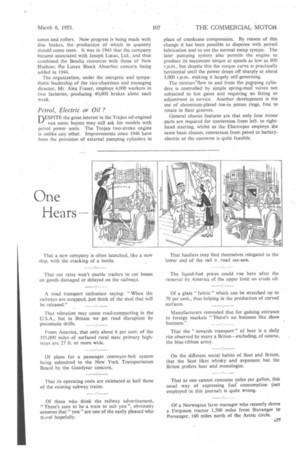Passing Comments
Page 28

Page 29

If you've noticed an error in this article please click here to report it so we can fix it.
Twenty Years of Ideas
nR IG IN A L1TY is welcomed at the Leyland Works;
recently a machine setter-up. Mr. F. Sofield, of Chorley, had an idea which brought him a cash reward of £55 for the best suggestion made by an employee during 19,2. The object was to simplify the reconditioning of Leyland oil engines sent by customers for overhaul. On a 9.8-litre unit, the new method saves about four hours and the cost of new valve-seat inserts. Mr. Sofield has made many other useful suggestions during his 20 years with the company.
Toll Road for Wisconsin ?
A FOUR-LANE super turnpike highway cutting "diagonally across the American State of Wisconsin from the Illinois border to the Minnesota border is under consideration. 1 he road will extend 287 miles without intersections, stop lights or sharp curves, permitting safe and steady travel at 60-70 m.p.h. The cost is estimated at about £200,000 per Mile, or a total of L57m.
No general charge will fall on the taxpayers. The whole project is to be financed by a bond issue, to be repaid from the tolls charged for the use of the highway. The toll for a passenger car is estimated at about Id. per mile. A Wisconsin State committee has recommended the scheme and the introduction of a Bill to create the Turnpike Authority is expected in the current session.
Can History Teach?
vtst-roRs to the works of old-established bodyv builders may in recent months have had opportunities of seeing examples of the bodybuilder's art dating back to the early part of the last century. Two stage coaches, formerly used on the LondonBrighton run, are in course of complete reconditioning by Vincents of Reading, Ltd., for use, no doubt, in pageants during the Coronation period.
Although these vehicles cannot compare in comfort with the modern motor coach, there arc, nevertheless, details which command respect. The A26 lockable boot at the rear was well contrived to carry luggage without causing damage, for its shape was symmetrical and the interior lined. Another item of interest is the brake lever. This, although long and heavy, is cunningly weighted and balanced about its pivots to enable the driver, on top, to exert his energy to apply the external brake shoes to the rear wheels without wasting it in lifting the heavy lever.
Conditions have changed so .much that little of value to modern technique can be derived from such studies, except proof that craftsmanship and skilled use of the available materials are as important to-day as ever.
"Kidding" a Conductor
AWOMAN, alighting from a Midland " Red " bus near Leominster, asked the conductor if it was permissible to bring " kids " on to the bus. The man replied: "Certainly, bring as many as you like." On the return journey, he was surprised when the inquirer boarded the bus, carrying .a young goat. " Kids " of this type do not seem to be covered by the regulations, particularly in respect of fares, so the conductor compromised by regarding it as a dog. Fortunately, the journey was not very long and there were no complaints concerning any unusual aroma.
Girling Majority Celebrated
A T the end of last month, Girling Ltd., of Tyseley, " Birmingham, celebrated its 21st year with the motor industry. It was in 1932 that New Hudson Ltd., its former name, turned from the production of cycles and motorcycles to the machining of motor components. Since then the company has earned a remarkable reputation for its brakes, dampers and other chassis equipment. Girling brakes are to be found on nearly 80 per cent. of goods vehicles and almost 100 per cent. of tractors.
This great success in the field of braking started with the development of the rod-operated model, in which the shoes were lifted by tappets actuated by a cones and rollers. Now progress is being made with disc brakes, the production of which in quantity should come soon. It was in 1943 that the company became associated with Joseph Lucas, Ltd., and thus combined the Bendix resources with those of New Hudson; he Luvax Shock Absorber concern being added in 1944.
The organization, under the energetic and sympathetic leadership of the vice-chairman and managing director, Mr. Alex Fraser, employs 4,000 workers in two factories, producing 40,000 brakes alone each week.
Petrol, Electric or Oil ?
DESPITE the great interest in the Trojan oil-engined van some buyers may still ask for models with petrol power units. The Trojan two-stroke engine is unlike any other. Improvements since 1946 have been the provision of external pumping cylinders in
place of crankcase compression. By reason of this change it has been possible to dispense with petrol] lubrication and to use the normal sump system. The later pumping system also permits the engine to produce its maximum torque at speeds as low as 800 r.p.m., but despite this the torque curve is practically horizontal until the power drops off sharply at about 3,000 r.p.m., making it largely self-governing.
The mixtureflow to and from the pupping cylinders is controlled by simple spring-steel valves not subjected to hot gases and requiring no fitting or adjustment in service. Another development is the use of chromium-plated toe-in piston rings, free to rotate in their grooves.
General chassis features are that only four minor parts are required for conversion from leftto righthand steering, whilst as the Electrojan employs the same basic chassis, conversion from petrol to batteryelectric or the converse is quite feasible.
































































































